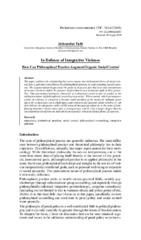In defense of integrative violence: How can philosophical practice augment organic social control?
Apstrakt
The paper explores the relationship between organic and institutional forms of social control from a potential contribution by philosophical practice to understanding social sanctions. The argumentation begins from the point of empirical fact that laws and constitutions
of various countries define the purpose of punishment in a utilitarian light in their preambles. This operational-utilitarian character of institutional social control is similar to the
utilitarian nature of philosophical consulting as practice. When control, which presupposes
a form of violence, is viewed in a broader understanding of the notion of violence, space
opens for a discussion on a challenging and controversial question about whether or not
can violence be integrative either in the sense of integrating values or in the sense of confirming someone’s social status after a transgression, and to what a larger degree than by
institutionalised and from an individual conceptually relatively distant forms of sa...nction.
Ključne reči:
organicism / institutional penalties / social control / philosophical counselling / integrative practicesIzvor:
Synthesis Philosophica, 2021, 36, 1, 109-124Izdavač:
- Zagreb : Hrvatsko filozofsko drustvo i Filozofski fakultet
Finansiranje / projekti:
- Ministarstvo nauke, tehnološkog razvoja i inovacija Republike Srbije, institucionalno finansiranje - 200025 (Univerzitet u Beogradu, Institut za filozofiju i društvenu teoriju) (RS-MESTD-inst-2020-200025)
Kolekcije
Institucija/grupa
IFDTTY - JOUR AU - Fatić, Aleksandar PY - 2021 UR - http://rifdt.instifdt.bg.ac.rs/123456789/2703 AB - The paper explores the relationship between organic and institutional forms of social control from a potential contribution by philosophical practice to understanding social sanctions. The argumentation begins from the point of empirical fact that laws and constitutions of various countries define the purpose of punishment in a utilitarian light in their preambles. This operational-utilitarian character of institutional social control is similar to the utilitarian nature of philosophical consulting as practice. When control, which presupposes a form of violence, is viewed in a broader understanding of the notion of violence, space opens for a discussion on a challenging and controversial question about whether or not can violence be integrative either in the sense of integrating values or in the sense of confirming someone’s social status after a transgression, and to what a larger degree than by institutionalised and from an individual conceptually relatively distant forms of sanction. PB - Zagreb : Hrvatsko filozofsko drustvo i Filozofski fakultet T2 - Synthesis Philosophica T1 - In defense of integrative violence: How can philosophical practice augment organic social control? IS - 1 VL - 36 SP - 109 EP - 124 DO - 10.21464/sp36107 ER -
@article{
author = "Fatić, Aleksandar",
year = "2021",
abstract = "The paper explores the relationship between organic and institutional forms of social control from a potential contribution by philosophical practice to understanding social sanctions. The argumentation begins from the point of empirical fact that laws and constitutions
of various countries define the purpose of punishment in a utilitarian light in their preambles. This operational-utilitarian character of institutional social control is similar to the
utilitarian nature of philosophical consulting as practice. When control, which presupposes
a form of violence, is viewed in a broader understanding of the notion of violence, space
opens for a discussion on a challenging and controversial question about whether or not
can violence be integrative either in the sense of integrating values or in the sense of confirming someone’s social status after a transgression, and to what a larger degree than by
institutionalised and from an individual conceptually relatively distant forms of sanction.",
publisher = "Zagreb : Hrvatsko filozofsko drustvo i Filozofski fakultet",
journal = "Synthesis Philosophica",
title = "In defense of integrative violence: How can philosophical practice augment organic social control?",
number = "1",
volume = "36",
pages = "109-124",
doi = "10.21464/sp36107"
}
Fatić, A.. (2021). In defense of integrative violence: How can philosophical practice augment organic social control?. in Synthesis Philosophica Zagreb : Hrvatsko filozofsko drustvo i Filozofski fakultet., 36(1), 109-124. https://doi.org/10.21464/sp36107
Fatić A. In defense of integrative violence: How can philosophical practice augment organic social control?. in Synthesis Philosophica. 2021;36(1):109-124. doi:10.21464/sp36107 .
Fatić, Aleksandar, "In defense of integrative violence: How can philosophical practice augment organic social control?" in Synthesis Philosophica, 36, no. 1 (2021):109-124, https://doi.org/10.21464/sp36107 . .



